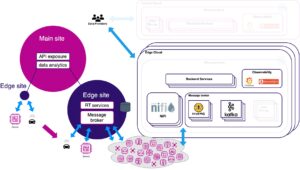InstantX 2.0.0 Release with Data flow management support and System to System integration
The InstantX community is excited to announce the release of InstantX 2.0.0, a major milestone that introduces powerful new features for seamless data flow management and system-to-system integration.

This release brings significant advancements with the introduction of the Event Publisher API and the Integration Framework, enabling more flexible, scalable, and efficient edge data integration. These enhancements directly address user needs around processing and routing data in real time across diverse environments.
Highlights of Release 2.0.0 include:
- Event Publisher API: Introduces a new REST API service for publishing hazard warnings (DENM) messages on InstantX.
- Integrated Framework: Improves integration, data transformation and data flow routing capabilities.
- AMQP connector: Provides AMQP inflow integration template for data management component.
- Event based interaction: Simplifies components interaction.
- Community and Support: The documentation has been improved to follow best practices, enhancing collaboration within the community
You can view 2.0.0 release notes here.
“I am extremely happy to announce the general availability of the 2.0.0 release”, said Sampada Basarkar, Executive Director of Products & Platform Engineering, Vodafone, “It’s exciting to see the new release provides a scalable, secure, robust infrastructure for collecting data from sensors, processing data at the edge using intelligent data pipelines and transporting data to historian and other management systems.”
What’s Next for InstantX?
Looking ahead, the InstantX project aims to continue expanding its capabilities and increasing value to developers and integrators alike. A key focus will be fostering collaboration across other Linux Foundation projects, encouraging shared innovation and unlocking new synergies throughout the ecosystem.
We invite the broader LF Edge and Linux Foundation communities to get involved—whether by contributing, testing new use cases, or joining discussions—to help shape the future of edge-native integration.